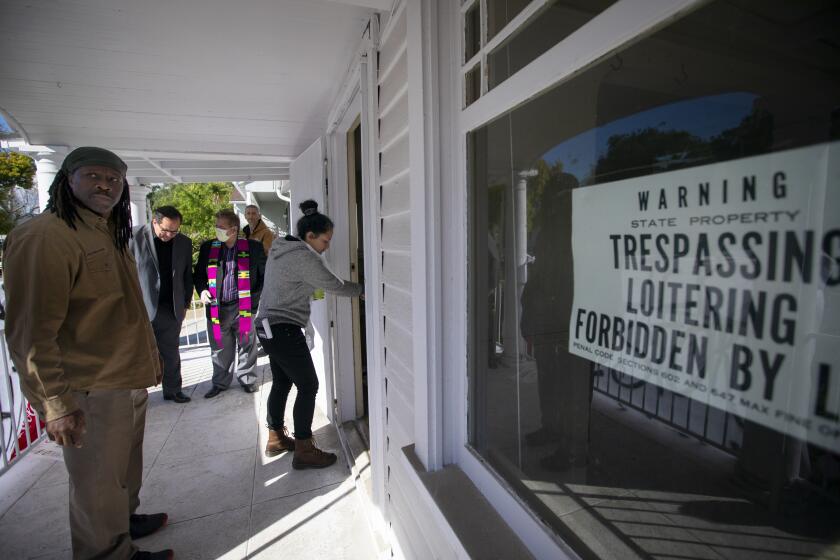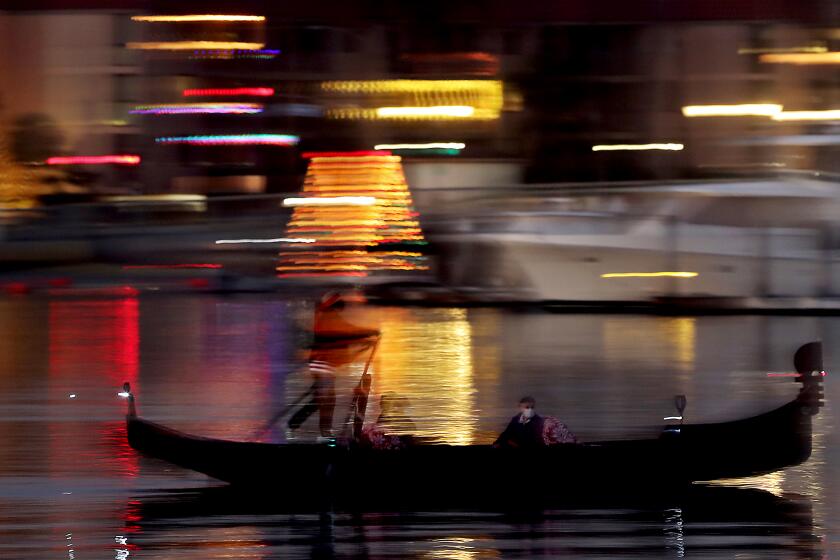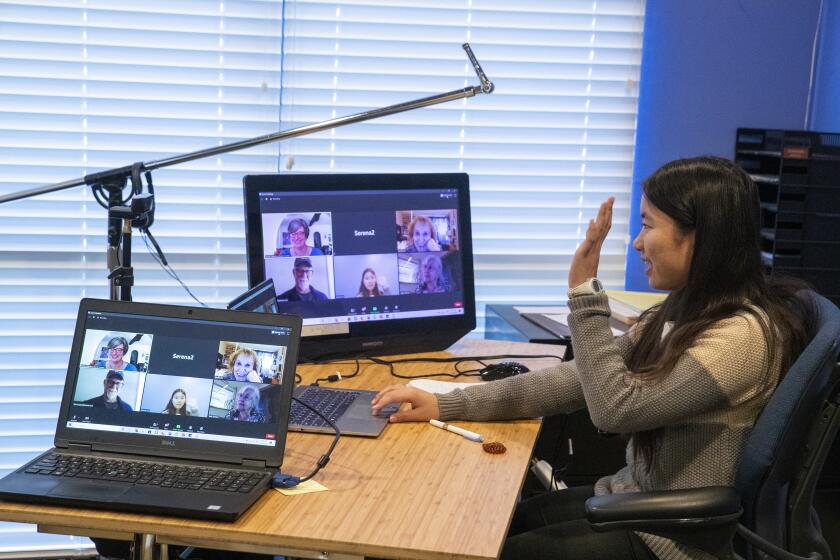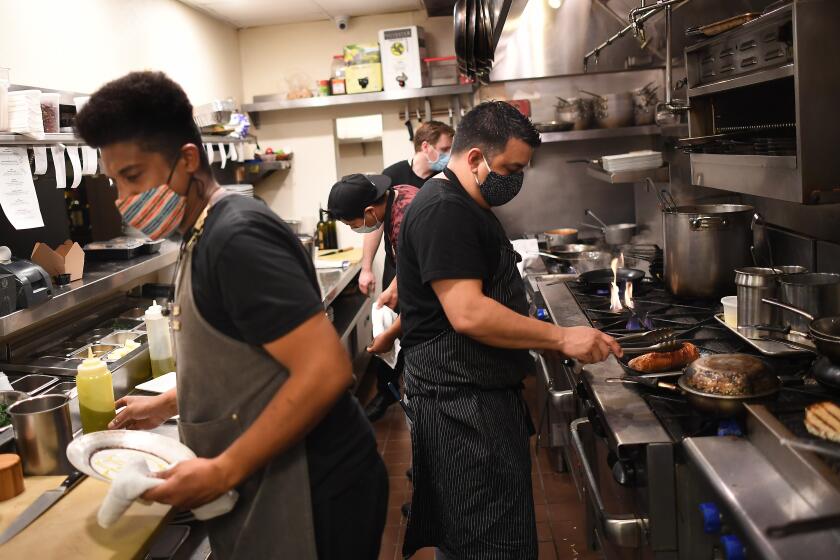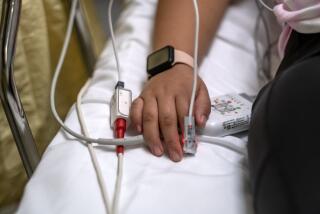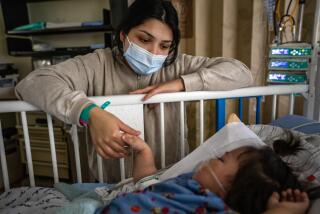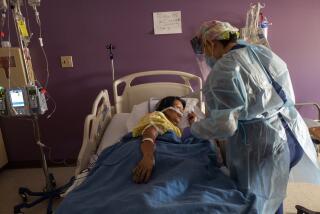Amid COVID-19 surge, health workers and families do their Thanksgiving best
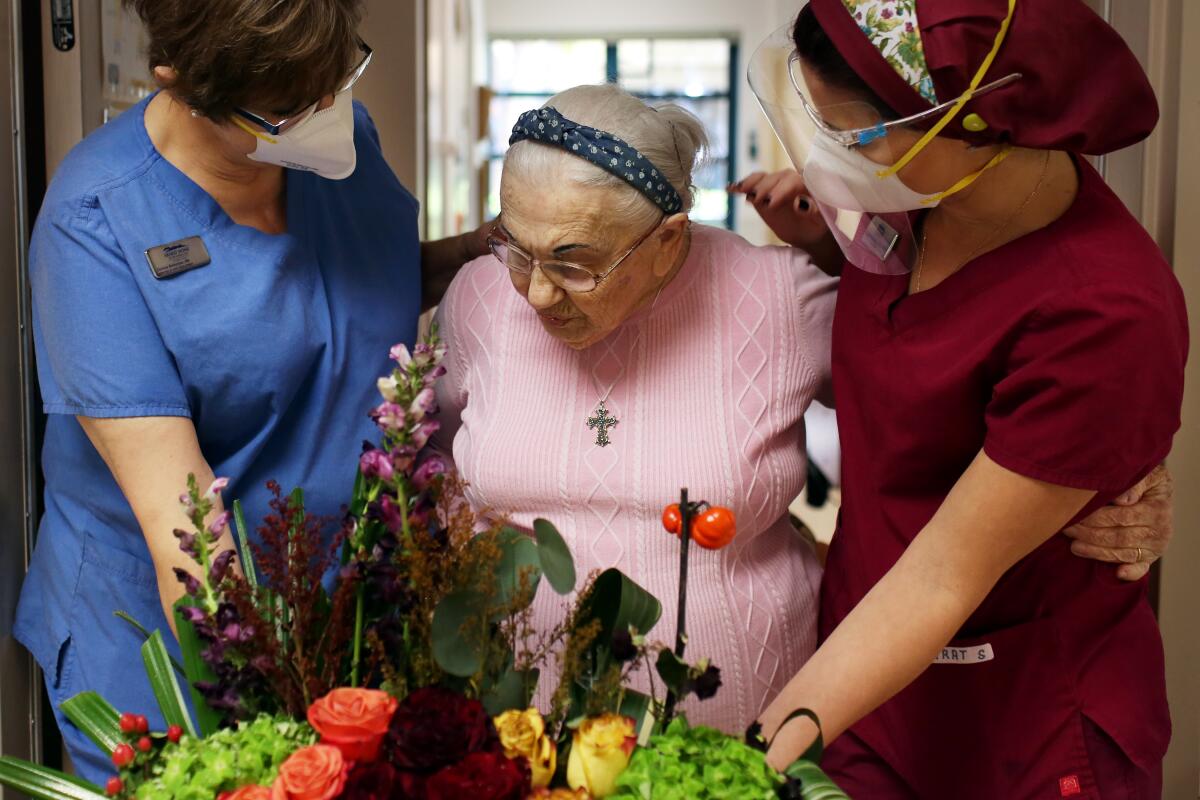
- Share via
Chris Varjabedian’s first stop after picking up his grandmother Zizi from her nursing facility was the salon. She hadn’t left the Mission Hills nursing home since March, before the COVID-19 pandemic erupted locally, and needed to get her hair and nails done if she was going to be home — finally — for the big holiday.
“She was on Cloud Nine, like being in Disneyland,” said Varjabedian, 34. “She’s really happy and in good spirits, and grateful to spend Thanksgiving with her family.”
Limited outdoor visits and calls from behind windows just hadn’t been enough for Varjabedian, who stops by Ararat Nursing Facility every Sunday to spend time with his grandmother — whom he got extra close with after his father’s death. So, after the better part of a year apart and a family decision that ensuring Zizi’s mental health was worth the risk of bringing her home, they did just that on Wednesday.
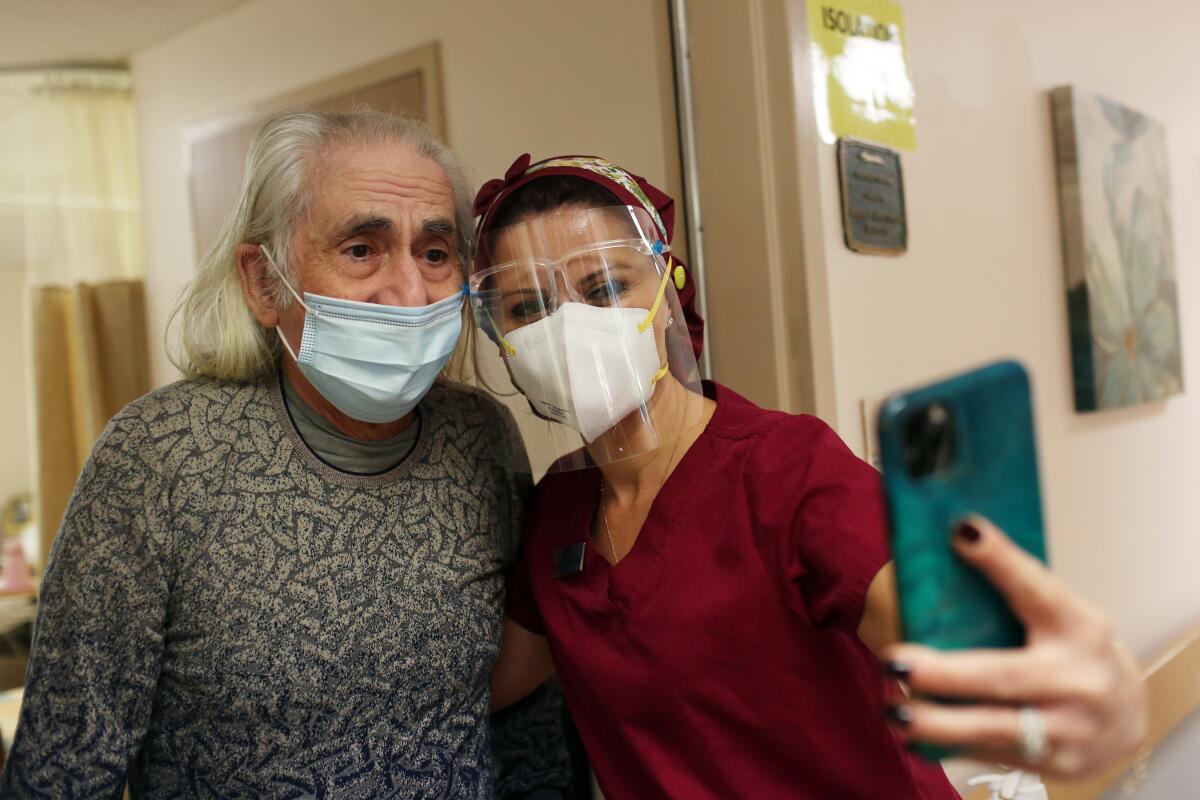
“It’s so rewarding,” said his mother, Suzy Varjabedian, of seeing Zizi light up at the chance of being with family again.
In a normal year, Thanksgiving is a festive time at many hospitals, nursing homes and other care facilities. Family members of patients stream in to pick up their loved ones, or bustle in with food to have fun there. They hug and laugh with their relatives, pushing back against the weight of whatever illness or injury has brought them there.
But in 2020, amid the latest surge of COVID-19 cases in Southern California and across the country — which on Thursday included 37 new deaths and more than 5,000 new cases in L.A. County alone — much of that has been curtailed. Hospitals and other facilities have implemented safety protocols severely restricting visitors, and in some instances banning them, in a desperate effort to ward off the spread of the virus.
The Thanksgiving eve evictions came as activists argued that government officials had failed to provide shelter to keep people safe during the pandemic.
Into the void have walked doctors and nurses, care providers and technicians, hospital facilities staff and administrators — some of whom are bound by the Hippocratic Oath to care for patients, all of whom have accepted personal health risks and intense mental and emotional fatigue to stare down the greatest medical threat of a generation and push forward, day after day, to help those in its crosshairs.
There are also the families of the elderly, ill or otherwise vulnerable, desperate to make the right decisions for their loved ones on a holiday even more oriented around family gatherings than most. Some are choosing head over heart and staying away, others deciding time together is too crucial to pass up during an already lonely year. Still others are trying to find some sort of balance, visiting through window panes or in socially distanced outdoor settings — forgoing the tactile comforts of a good holiday hug for fear that it might turn out to be a deadly embrace.
Gov. Gavin Newsom has announced a stay-at-home order affecting most of California.
Those who are keeping their distance are leaving their loved ones in the care of health workers who themselves are sacrificing family time. Many said Thursday that they were doing their duty, showing up as they have for months on end, despite the fatigue.
“We should be very thankful that we do have such a great healthcare system that has pivoted in just a matter of months to improve treatment and take care of people,” said Dr. Bill Stringer, a pulmonary critical care physician and head of the pulmonary division at Harbor-UCLA Medical Center. “It’s an army.”
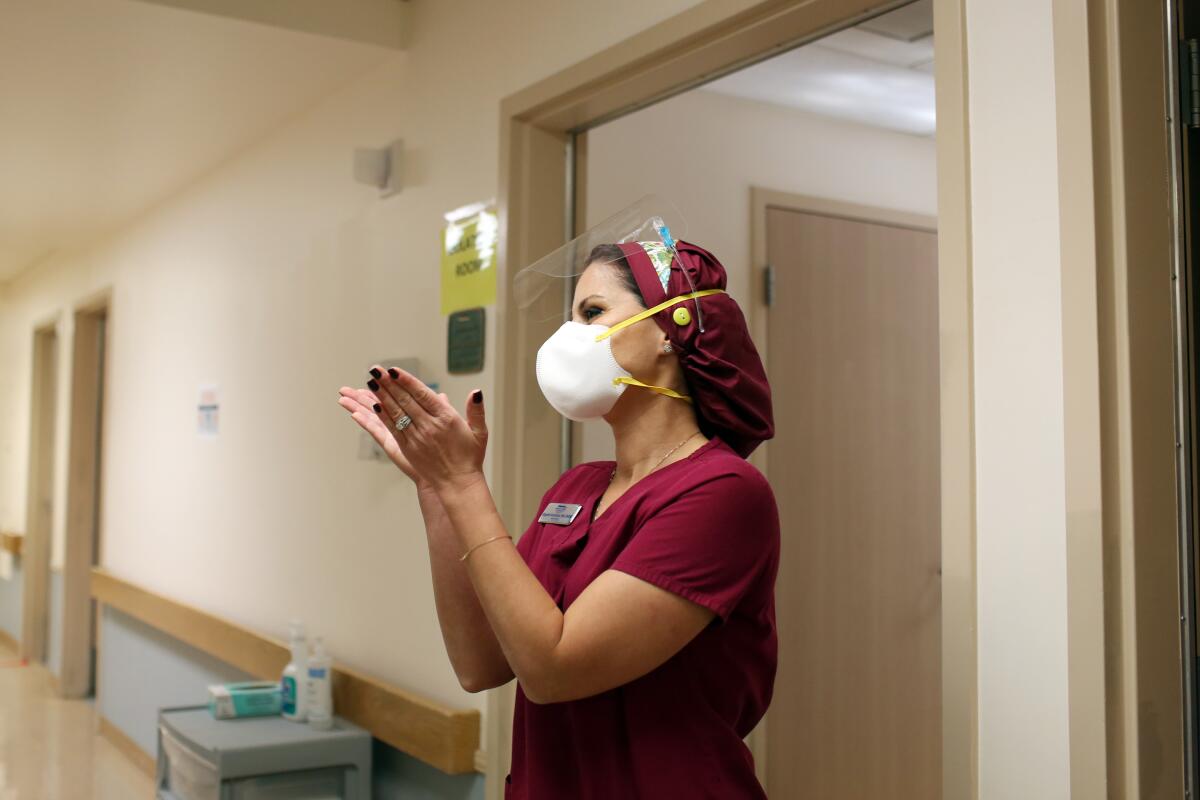
Stringer, 63, said he signed up to work the Thanksgiving holiday so younger colleagues with families could be at home. This year, that means dealing with patients who are critically ill from COVID-19 and the strange circumstances that come with the associated precautions — like trying to help patients communicate electronically with family members who can’t be in the hospital, even as some patients approach death.
To Pasadena seniors, Glendora High student Serena Lin is a big hit
“That’s obviously hard on the family, hard on the patient, but it’s hard on us too, because we have to be the ones who are there in the last minutes, the last seconds of people’s lives,” Stringer said.
Still, Stringer said he wouldn’t want to be anywhere else this year. “Being a healthcare provider is a gift,” he said, “and I think we’re all thankful for that.”
Ronnel Leones has always made it a point to put on a happy face when he makes rounds and sits at the bedsides of patients at Rancho Los Amigos National Rehabilitation Center in Downey. Coming from a big family of nurses — including his wife, his mom and dad, his twin brother and his sister-in-law — Leones said he wants to make his family proud and do right by his patients by giving his all.
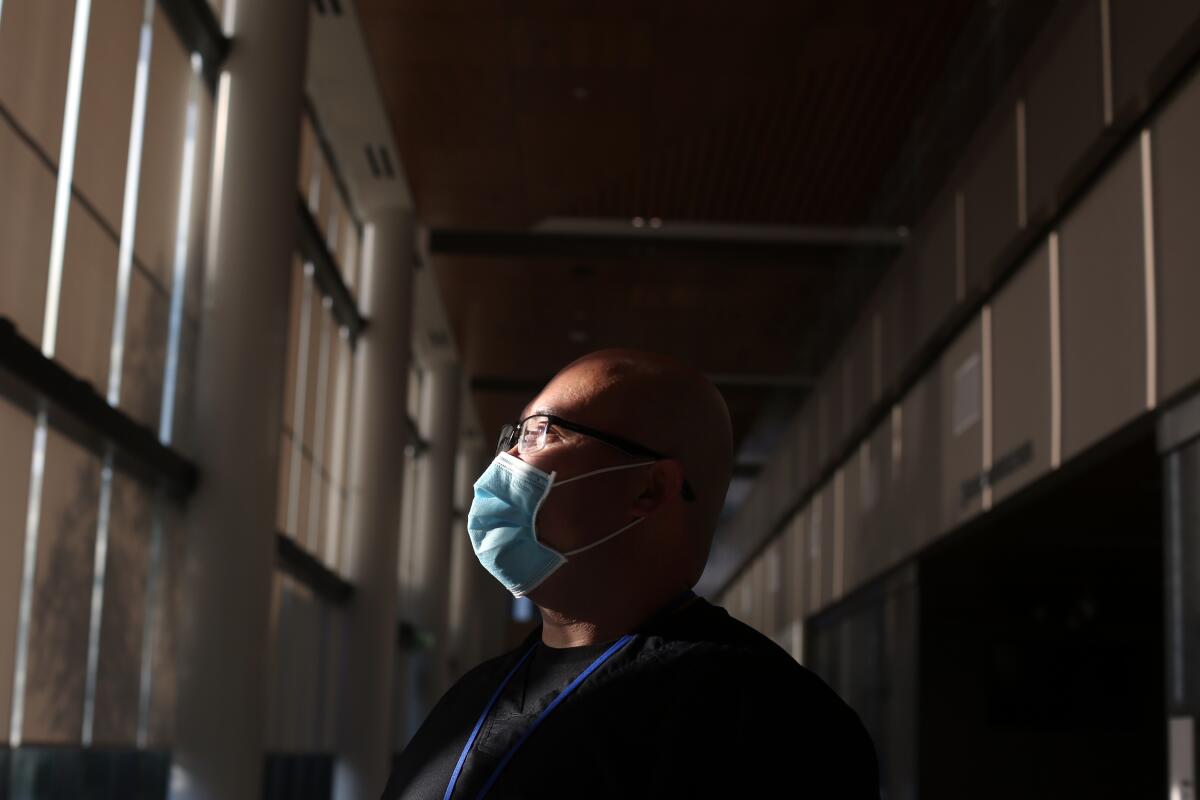
But that instinct has never been more important than this year, he said, when the extra effort might be as simple as giving a patient an extra clean shave so he can look his best for a FaceTime call home to family.
“We want patients here to feel loved, cared for. It’s what they deserve, and it’s what we signed up for,” Leones said in the middle of a Thanksgiving shift Thursday. “We want to show resiliency and hope.”
Leones, a 34-year-old father of two girls ages 5 and 6, contracted COVID-19 himself in March, along with one of his closest friends. He recovered, but his friend — an otherwise healthy 38-year-old — died, he said. For weeks he was terrified his daughters would get sick.
Now, back at work, Leones believes his own experience with the illness has helped him treat patients in the intensive care unit. He said this year has been tough, but days like Thursday — working the holiday away from family — have been made easier by the bonds that hospital staff have made with one another after such a tough year.
“It’s about our camaraderie,” he said. “We give hope to each other.”
From Long Beach to Chinatown, restaurant workers and customers worry yet hope for the best on the day before the coronavirus shutdown — again.
Erika Flores Uribe, an emergency medicine physician at Los Angeles County-USC Medical Center, was working a 7 a.m.-to-3 p.m. shift on Thursday. Usually on Thanksgiving, doctors and nurses have a big potluck lunch, she said. Not wanting to gather this year, they just ordered pizza, she said. But the shift seemed extra special.
Having grown up in southeast L.A., seeing COVID-19 disproportionately affect communities of color there has made her work this year feel personal, and being at the hospital on Thanksgiving — helping Spanish-speaking patients feel more comfortable by conversing with them in their native tongue — all the more important, she said.
“The way that we’ve shown up every day, especially the holidays, really reflects that oath we took to take care of the community,” she said.
Joel Clark, an emergency room technician, was spending his Thanksgiving working at El Centro Regional Medical Center as part of a traveling assignment to help hospitals across the country. The 22-year-old, spending his first big holiday away from his family in Santa Cruz, described his 12-hour holiday shift as part of a team effort — one in which he knows some of his patients are homesick just like he is.
“Not only am I alone here, but the patients are, too. They don’t have access to family members visiting. So it’s like we’re all together,” he said. “It kind of feels like a community. We’re kind of all alone, but we’re still here.”
Dr. Nikhil Barot, a pulmonary critical care physician at Olive View-UCLA Medical Center, said he was working day shifts Thursday and through the weekend, assisting staff as they watch over ICU patients with COVID-19 as his “superstar” wife — a nurse on leave — watched over their 5-month-old twins at home.
Even at night, he takes calls, as he did Wednesday night. Four times between 11 p.m. and 2 a.m. Thursday, staff reached out to him about a COVID-19 patient who was crashing. Despite their best efforts, the patient died, he said.
Barot said he and other medical staff fear a coming wave of new patients. They will be there to meet it, he said, but they hope people outside of hospitals will do their part to flatten the curve — wearing masks, washing their hands, following the directions from public health officials.
Jeanie Bergen, 36, hopes for the same — for her and her sister’s sake.
Bergen’s sister Edna, 37, has intellectual disabilities and lives in a care facility in the Valley. Bergen is her sister’s guardian, with their parents having passed away, and tries to visit her as much as possible. But in recent months, the facility locked down completely after having several COVID-19 cases among staff and residents.
Finally this week, Bergen was able to visit again, but only from a distance. She and her sister sat outside, socially distanced. It was a comfort after only seeing her sister through a pane of glass for so long, Bergen said, but they still couldn’t communicate “by holding hands and sitting close and hugging,” as they always have.
It was hard, especially when she thought about others in Los Angeles who have not heeded public health messages to stop the spread of the virus.
“I wish people would realize that we are all connected and their choices affect other people that they will never meet,” she said. “I can’t hold my sister’s hand, I can’t take her in the car, I can’t explain to her why none of that is happening. It’s really hard. It’s painful. And I just have to pray every day and hope that there’s not another outbreak.”
More to Read
Sign up for Essential California
The most important California stories and recommendations in your inbox every morning.
You may occasionally receive promotional content from the Los Angeles Times.
